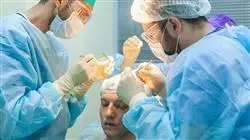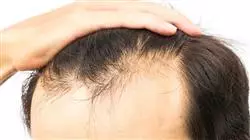University certificate
The world's largest faculty of medicine”
Introduction to the Program
Thanks to this online program you will be able to update your knowledge on the main pathologies of the scalp and their treatments"

Scientific studies, the use of new technologies and innovation in intervention methods have given a considerable boost to hair transplants. In this process, the role of medical professionals has undoubtedly been key, since their knowledge and technical skills have allowed surgical treatments to achieve great acceptance among the population and to move away from the taboo and negative image of undergoing this aesthetic therapy.
At the same time, the boom in recent years of these treatments has led to the opening of more specialized clinics in the world, where the profiles of highly qualified surgeons, trichologists, dermatologists or anesthesiologists are increasingly in demand. For all these reasons, this Professional master’s degree provides the specialist with a university education that will allow them to update their knowledge throughout the 12 months of its duration. The multimedia teaching material will lead the students to deepen their knowledge of the main hair-related diseases, dedicating a space to androgenic alopecia, cosmetic treatments and FUSS and FUE techniques.
In addition, simulations of clinical cases provided by the expert teaching staff will serve to bring students closer to real situations, helping them to broaden their skills. The professional has before them a program with a theoretical-practical approach oriented to offer the most recent knowledge and scientific rigor in the field of Hair Transplantation.
An advanced and intensive university program, but with the convenience of being able to take it exclusively online, without fixed class schedules. Thus, TECH favors that the medical professional can take a quality education compatible with their work responsibilities. Students only need a computer, tablet or cell phone to connect to the virtual platform where the syllabus is stored. Enriched content is available in full from day one, which gives students the freedom to distribute the course load according to their needs. The professional is, therefore, provided with flexible teaching that is at the academic forefront.
A Professional master’s degree that gives you the opportunity to access the latest content on advances in cloning and pharmacology for the resolution of patients' trichological problems"
This Professional master’s degree in Hair Transplantation contains the most complete and up-to-date scientific program on the market today, with the following notable features:
- Practical cases presented by experts in hair surgery
- The latest developments in Hair Surgery, with special and dedicated attention to the innovative methodologies
- Practical exercises where the self-evaluation process can be carried out to improve learning
- Graphic contents, diagrams, and practical cases that gather scientific and practical information on the disciplines that are essential for professional hair surgery practice
- Theoretical lessons, questions to experts and/or tutors, discussion forums on controversial issues and individual reflection work throughout the progam
- Content that is accessible from any, fixed or portable device, with an internet connection
A Professional master’s degree that will give you 24-hour access to scientific and exhaustive content on Hair Transplantation"
The program’s teaching staff includes professionals from sector who contribute their work experience to this program, as well as renowned specialists from leading societies and prestigious universities.
The multimedia content, developed with the latest educational technology, will provide the professional with situated and contextual learning, i.e., a simulated environment that will provide immersive training programmed to train in real situations.
This program is designed around Problem-Based Learning, whereby the professional must try to solve the different professional practice situations that arise throughout the program. For this purpose, the student will be assisted by an innovative interactive video system created by renowned and experienced experts.
A 100% online, flexible educational program that allows you to distribute the course load according to your needs"

Deepen your knowledge of androgenetic alopecia and the AGA diagnostic study with this online program"
Why study at TECH?
TECH is the world’s largest online university. With an impressive catalog of more than 14,000 university programs available in 11 languages, it is positioned as a leader in employability, with a 99% job placement rate. In addition, it relies on an enormous faculty of more than 6,000 professors of the highest international renown.

Study at the world's largest online university and guarantee your professional success. The future starts at TECH”
The world’s best online university according to FORBES
The prestigious Forbes magazine, specialized in business and finance, has highlighted TECH as “the world's best online university” This is what they have recently stated in an article in their digital edition in which they echo the success story of this institution, “thanks to the academic offer it provides, the selection of its teaching staff, and an innovative learning method aimed at educating the professionals of the future”
A revolutionary study method, a cutting-edge faculty and a practical focus: the key to TECH's success.
The most complete study plans on the university scene
TECH offers the most complete study plans on the university scene, with syllabuses that cover fundamental concepts and, at the same time, the main scientific advances in their specific scientific areas. In addition, these programs are continuously being updated to guarantee students the academic vanguard and the most in-demand professional skills. In this way, the university's qualifications provide its graduates with a significant advantage to propel their careers to success.
TECH offers the most comprehensive and intensive study plans on the current university scene.
A world-class teaching staff
TECH's teaching staff is made up of more than 6,000 professors with the highest international recognition. Professors, researchers and top executives of multinational companies, including Isaiah Covington, performance coach of the Boston Celtics; Magda Romanska, principal investigator at Harvard MetaLAB; Ignacio Wistumba, chairman of the department of translational molecular pathology at MD Anderson Cancer Center; and D.W. Pine, creative director of TIME magazine, among others.
Internationally renowned experts, specialized in different branches of Health, Technology, Communication and Business, form part of the TECH faculty.
A unique learning method
TECH is the first university to use Relearning in all its programs. It is the best online learning methodology, accredited with international teaching quality certifications, provided by prestigious educational agencies. In addition, this disruptive educational model is complemented with the “Case Method”, thereby setting up a unique online teaching strategy. Innovative teaching resources are also implemented, including detailed videos, infographics and interactive summaries.
TECH combines Relearning and the Case Method in all its university programs to guarantee excellent theoretical and practical learning, studying whenever and wherever you want.
The world's largest online university
TECH is the world’s largest online university. We are the largest educational institution, with the best and widest online educational catalog, one hundred percent online and covering the vast majority of areas of knowledge. We offer a large selection of our own degrees and accredited online undergraduate and postgraduate degrees. In total, more than 14,000 university degrees, in eleven different languages, make us the largest educational largest in the world.
TECH has the world's most extensive catalog of academic and official programs, available in more than 11 languages.
Google Premier Partner
The American technology giant has awarded TECH the Google Google Premier Partner badge. This award, which is only available to 3% of the world's companies, highlights the efficient, flexible and tailored experience that this university provides to students. The recognition as a Google Premier Partner not only accredits the maximum rigor, performance and investment in TECH's digital infrastructures, but also places this university as one of the world's leading technology companies.
Google has positioned TECH in the top 3% of the world's most important technology companies by awarding it its Google Premier Partner badge.
The official online university of the NBA
TECH is the official online university of the NBA. Thanks to our agreement with the biggest league in basketball, we offer our students exclusive university programs, as well as a wide variety of educational resources focused on the business of the league and other areas of the sports industry. Each program is made up of a uniquely designed syllabus and features exceptional guest hosts: professionals with a distinguished sports background who will offer their expertise on the most relevant topics.
TECH has been selected by the NBA, the world's top basketball league, as its official online university.
The top-rated university by its students
Students have positioned TECH as the world's top-rated university on the main review websites, with a highest rating of 4.9 out of 5, obtained from more than 1,000 reviews. These results consolidate TECH as the benchmark university institution at an international level, reflecting the excellence and positive impact of its educational model.” reflecting the excellence and positive impact of its educational model.”
TECH is the world’s top-rated university by its students.
Leaders in employability
TECH has managed to become the leading university in employability. 99% of its students obtain jobs in the academic field they have studied, within one year of completing any of the university's programs. A similar number achieve immediate career enhancement. All this thanks to a study methodology that bases its effectiveness on the acquisition of practical skills, which are absolutely necessary for professional development.
99% of TECH graduates find a job within a year of completing their studies.
Professional Master's Degree in Hair Transplantation
If there is an aesthetic dilemma that has caused misfortune among the male (and occasionally female) population throughout history, it is undoubtedly hair loss. The problem has been so recurrent that the most diverse solutions have been proposed: from the use of caps and toupees to the creation of allegedly miraculous tonics. In today's world, science and technology have the answer. The Professional Master's Degree in Hair Transplant offered by TECH Global University is an online postgraduate course aimed at all doctors who wish to develop skills in the operating room to cover one of today's most sought-after treatments. Do you want to be at the forefront of a constantly growing market such as cosmetic surgery? This is your opportunity. Our interactive, flexible education model, with real clinical cases and taught by a highly qualified teaching staff, is that plus of professional growth that you will not find anywhere else. Learn to diagnose and apply hair medicine accurately with the facilities provided by our learning center.
Learn all about hair transplant
Between one thousand and five thousand follicular units distributed between 30 and 90 per square centimeter, are those required on average to perform an optimal hair implant. The meticulousness that must prevail in the process is not only extensive, but its success is subject to multiple other factors. A mistake in the operation can be the equivalent of infections, painful inflammations and even unaesthetic final aspects. In short: you must have a solid and extensive knowledge of the subject to ensure patient satisfaction. Our program has a detailed syllabus of ten modules that covers from the different types of alopecia, through the various techniques of hair transplantation to the medical-legal, economic and marketing aspects that encompasses the entire practice of trichology. The program we offer is so complete that you will be able to deal with cases of hair loss in both men and women. Do you want to get a program that will boost your curricular status and earn you outstanding positions in the clinical and aesthetic sector? Come study online with us.







